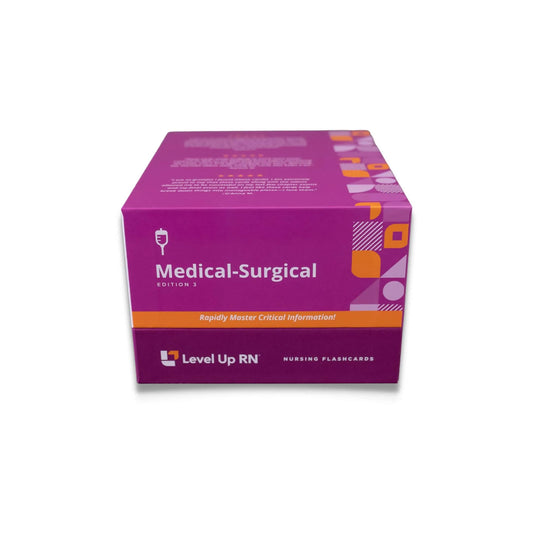In this article, we give an overview of the topics in the immune system that you will need to know about for your Med-Surg and Critical Care classes. We also give you a refresher on how the immune system works, the two main types of immunity, and the inflammatory response. These topics are covered in our Medical-Surgical Flashcards (Immune system), and Cathy’s video follows along with the cards.
Medical-Surgical Nursing - Flashcards
Med-Surg immune system topics
These are the topics that we will cover in the Immune System playlist for Med-Surg. These are the topics in the immune system that you should know for your exams!
- Innate vs. acquired immunity, inflammation
- Acquired immunity - humoral and cellular
- Immune system malfunction & infection
- Immune diagnostic tests: white blood cells, neutrophils, ESR, CRP
- Systemic lupus erythematosus
- Systemic sclerosis
- HIV/AIDs
- Cancer overview
- Tumor classification
- Chemotherapy, radiation, and complications (malnutrition, mucositis)
- More cancer treatment complications (neutropenia, anemia, thrombocytopenia)
- Skin and blood cancers
- Endometrial, cervical, ovarian and breast cancer
- Prostate, colorectal and lung cancer
What does the immune system do?
The overall function of the immune system is to protect the body from disease-causing microorganisms and keep you healthy.
Types of immunity
The actions that your immune system takes inside your body to protect you are known as the immune response. We divide the immune response into two categories: innate and acquired immunity. These categorizations differ in which antigens they respond to.
Antigens
Antigens are any substance that your immune system responds to and wants to get rid of. So, immunity acts against antigens, and antigens are things that your immune system reacts against.
This might seem like a circular definition, and it is. But you can think of it this way: the immune system is very smart, and it has three working rules:
- Substances with a different molecular makeup than that of your body are foreign
- Foreign substances are bad for you
- It needs to protect you against them
Innate immunity
Innate immunity is something that everybody is born with. These are defense mechanisms that help protect the body by acting against all antigens. It’s important to note innate immunity acts against all antigens, not just specific antigens.
Our innate immunity includes:
- Skin — without skin, harmful microorganisms would just be directly jumping into our bloodstream and organs and we would be toast.
- Stomach acid — we swallow bacteria all the time, but luckily our stomach acid neutralizes it so it’s harmless to us (most of the time)
- Mucus — we also breathe in bacteria all the time, but luckily our mucus traps the bacteria and kills it
- Phagocytic cells (usually white blood cells) — they also mobilize and kill bacteria
The inflammatory response (inflammation)
The inflammatory response is an important part of our innate immunity. Inflammation is your body’s protective reaction to injury, disease, or damage to tissues in your body. Inflammation happens in three stages:
- Warmth, erythema (redness), edema (swelling), decreased function or pain at the site of injury
- White blood cells kill off the microoganisms; dead tissue cells and exudate (fluid that’s a byproduct of the WBCs having killed bacteria, also known as pus) accumulate at the site of injury
- The damaged tissue is replaced by scar tissue
Acquired immunity
Acquired immunity is the process by which we produce antibodies against specific antigens, and we develop acquired immunity through the action of B and T cells. Acquired immunity can be cellular or humoral, and we will cover that in our next article.
Video on acquired immunity (cellular vs. humoral)
Cathy’s teaching on the immune system is intended to help prepare you for Medical-Surgical nursing exams. The Medical-Surgical Nursing video series is intended to help RN and PN nursing students study for nursing school exams, including the ATI, HESI and NCLEX.



1 comment
Hello! I just purchased the value pack with the 10 sets of flash cards. I am wondering if there is a suggestion for boxes/containers to keep them in? Thank you!!